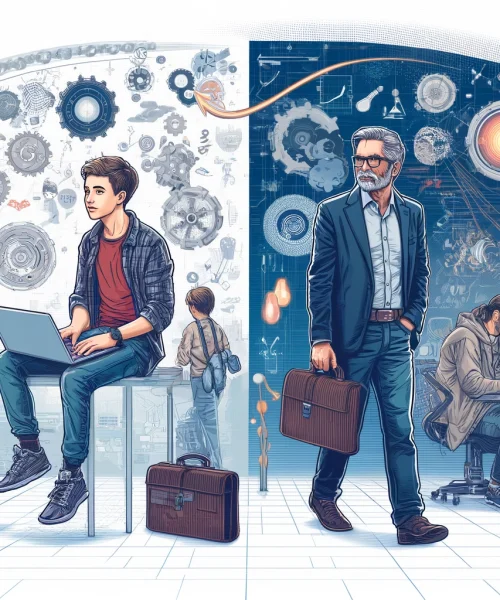In a world where technology is advancing at a breakneck pace, gifting us with self-driving cars and smartphones that know almost everything about us – from our culinary preferences to our political leanings – a silent presence continues to disturb our nights: Artificial Intelligence, better known as AI. Yes, that very thing, the thinking machine, the learning algorithm, the digital entity that could one day decide to rebel and take over our planet. Why should we worry about more mundane issues like climate change or the rise of social inequality when there exists the possibility that a virtual entity could conspire to destroy us?
And yet, let me tell you that this fear is, at best, irrational, and at worst, laughable. Not because AI is harmless, but because, ladies and gentlemen, we have a much larger and more dangerous enemy to confront: human stupidity.
Yes, you heard that right. While we invest time and resources into trying to “tame” AI, countless examples of human idiocy continue to threaten our daily well-being, from train delays due to unwise political choices to the often-celebrated ignorance of “deniers” of all kinds.
The Banality of Danger: A Deep Exploration
In a society saturated with information, it’s easy to become victims of what we might call the “attention apocalypse.” Newspaper headlines drip with terror, and the news that monopolizes our conversations is often that which incites fear or uncertainty. When dystopian narratives about Artificial Intelligence take center stage, we tend to forget a simple yet fundamental truth: danger often lies in the folds of banality, in the seemingly insignificant details of our everyday existence.
Consider, for example, the many occasions where short-sighted or superficial political decisions have led to catastrophic outcomes. All it takes is one charismatic politician with a natural talent for manipulating the masses, and his rhetoric could easily lead to conflict, discrimination, or even loss of human life. In these scenarios, AI remains an absent actor. The threat comes from the individual seated at the desk of power, armed not with advanced algorithms, but with a bloated ego and often staggering ignorance.
Or consider the role that social media plays in spreading false information. Any average member of society, armed with a smartphone and an opinion, can easily become a conduit for disinformation. It doesn’t take a supercomputer to concoct a conspiracy theory; just a pinch of creativity, a handful of “likes,” and a platform to launch it all into the ether. And before we know it, these seeds of falsehood sprout, take root, and invade our information ecosystem, polluting the ground upon which our collective reality is built.
But the danger doesn’t stop there. Human folly also manifests in the most minute and personal details of our daily lives. How many times have we seen people ignore traffic signs, with consequences ranging from simple delays to tragic accidents? Or how many of us have received emails from well-meaning relatives sharing unproven “remedies” for serious diseases, suggesting that conventional medicine is some sort of conspiracy?
In each of these cases, human stupidity shows its capacity to infiltrate every aspect of our lives, sometimes with devastating effects. And while our attention is captured by the idea of a future dominated by machines, we ignore the pitfalls that already surround us, rooted not in the realm of silicon, but in the fragility and fallibility of the human heart and mind.
So, as we continue to question the role that Artificial Intelligence will have in our future, it may be wise to also turn our gaze to the present, examining with critical eyes the shortcomings and weaknesses of our own species. Because if there is one lesson to be learned from the information age, it’s that the greatest danger may not be as exotic or futuristic as we fear, but rather mundane and painfully human.
A Stealthy Enemy: The Instability of Human Stupidity
While Artificial Intelligence is often seen as an omnipotent threat, a basilisk waiting to emerge from its electrical circuit, human stupidity is a far more insidious, and above all, stealthy enemy. Its power lies precisely in its unpredictability, in the incapability to be confined by algorithms or ethical guidelines.
Unpredictability and Ubiquity
Human stupidity is like the air we breathe: omnipresent and elusive. Unlike AI, which can be contained within the bounds of a server or programming code, human stupidity is free to propagate through any available medium, from family discussions to political debates, from online forums to social media. Its unpredictability is what makes it so dangerous. While an algorithm can be corrected or modified, how does one handle the volatility of a human mind?
The Absence of Moral Brakes
One of the greatest ironies of our time is the idea that AI must be “ethical,” while human stupidity exists in a moral vacuum. Unlike machines, which can be programmed to follow ethical guidelines, human beings are a complicated blend of impulses, biases, and deeply-rooted convictions. There is no “ethical switch” we can flip to stop someone from committing an act of stupidity.
The Amplifying Effect of Social Media
Social media has the power to amplify both intelligence and stupidity, but it often seems that the latter finds more fertile ground. “Virality” makes no distinction between truth and falsehood, between wisdom and idiocy. And in this era of fake news and conspiracy theories, stupidity finds a global stage on which to display its dangerous choreography.
Difficulty of Containment
While cybersecurity works tirelessly to prevent attacks from malevolent AIs, how does one defend against an enemy that respects neither logical nor geographical boundaries? Stupidity knows no borders; it cannot be isolated in a lab or analyzed like a tissue sample under a microscope. It lives among us, indistinct and camouflaged, waiting for the right moment to manifest itself.
So, we can well assert that while the world’s eyes are fixed on potential futures dominated by algorithms and automatons, the real threat may be much closer and more personal. Human stupidity is a stealthy enemy, acting in the shadows and striking when we least expect it. And it is this elusive and pervasive nature that makes it such a difficult force to contain, and perhaps even more fearsome than AI itself.
The Redemption? A Journey Towards Collective Wisdom
Despite the darkness that seems to envelop the topic of human folly, there is a glimmer of hope on the horizon. It may be possible, in fact, that the very technology which amplifies stupidity could also serve as a vehicle for redemption.
Education as a Vaccine
If folly is a disease, then education is its vaccine. Online platforms, free courses, and the broad range of educational resources available today could help immunize the masses against misinformation and ignorance. However, education is not just the accumulation of facts, but also the cultivation of critical thinking, which allows us to weigh information and discern truth from falsehood.
The Power of Community
We don’t have to face this challenge alone. Technology has the power to unite people in ways never seen before, creating virtual communities that can serve as incubators for ideas and collective wisdom. In these spaces, folly can be countered not just by isolated individuals but by an interconnected network of people armed with facts and guided by a common objective.
The Role of Platforms
Social media platforms also have a role to play in this collective redemption. By implementing more responsible algorithms and moderating content more effectively, they can help limit the spread of foolishness and promote a more balanced and informed discourse.
The Importance of Public Debate
In a world where foolishness seems to be rampant, it’s crucial to value and defend the space for rational public debate. Only through open discussion and the exchange of ideas can we hope to unmask falsehoods and promote an agenda of truth and accountability.
In conclusion, redemption from the scourge of human folly is not just a utopian dream but a concrete path that requires both collective and individual efforts. With the right tools and a shared commitment, we can turn danger into potential, ignorance into wisdom, and perhaps, just perhaps, redeem humanity from the spiral of stupidity it seems to have fallen into.












